 Covid and community – can we build a green and fair recovery?
Covid and community – can we build a green and fair recovery?
Graham Duxbury, CEO, Groundwork
The speed with which Covid-19 brought the world to a halt is a graphic illustration of our international inter-connectedness. It has also acted as a powerful reminder of the importance of connections at a much more local level – in our streets, neighbourhoods and communities.
As with other powerful global forces – from a changing economy to the climate and nature emergency – those hit hardest by the pandemic are those who were already suffering most from material hardship and health inequalities. It is now clear that deaths in the UK are disproportionate in disadvantaged areas and among BAME communities and the lasting impact of the virus, which is only just being understood, will increase the number of people in these areas living with long-term conditions. Our ability to cope with social isolation is likewise conditioned by inequality. Recent research shows that black families are much less likely to have access to outdoor space than the rest of the population and, although visits to the local park have increased during lockdown, those who would most benefit from the restorative effects of nature – older people and those with health conditions – are visiting less. The same will be true of the economic crisis that is following hard on the heels of the health crisis as people in insecure, low paid jobs – primarily young people and women – pay the price of the shutdown.
Many have referred to the pandemic as a wake-up call, which demands a moment of ‘re-set’.
What does this all mean for people who are suffering now, and for others who will be impacted by the long aftermath to the crisis? For many in the UK, the immediate need is coping with the fact that not all jobs will reappear post-furlough, schools will remain disrupted for several months and those who are most vulnerable will continue to feel isolated and anxious as the lockdown is eased.
As scientists search for vaccines and governments attempt to tackle the colossal financial impact of the shutdown, we should remember that many of the solutions are in our hands, and can be driven at a local level. Moreover, a focus on building community resilience will enable us to ensure our recovery locks in some of the positive environmental behaviours that have emerged and helps to ‘level up’ opportunity and prosperity. For example, helping people waste less water, food and energy keeps household finances under control. Adopting sustainable travel and volunteering to look after local green spaces keeps us physically fit and mentally well. Being better equipped and organised as a community means we can support those in our neighbourhoods who are most in need and hold local institutions to account for the way they deliver the services on which we rely.
As we emerge from hibernation we have an opportunity to re-configure our social infrastructure in a way that harnesses the community spirit we’ve witnessed and prepares us all better for future emergencies. To make our recovery both green and fair we need prioritise the places that have borne the brunt and the people who are paying the highest cost.
Biography
Graham Duxbury was appointed Groundwork’s national Chief Executive in March 2014. He has nearly 20 years’ experience of helping public and voluntary sector organisations reach new audiences and deliver strategic communications and development campaigns. He was previously Groundwork’s Director of Development – responsible for building national relationships and partnerships, generating income, developing national programmes and leading on policy and strategic communications. Graham joined Groundwork UK in 1998, prior to which he undertook a number of communications roles in the voluntary, public and private sectors.
